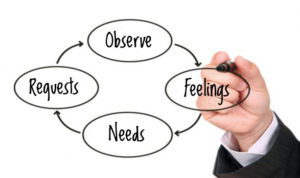NVC = non-violent communication. Some people prefer the term “compassionate communication”.
I want to talk about NVC and liberty — because as I see it, the two are related in are highly interesting way, that I’d like to share with you.
The man behind NVC is Marshall Rosenberg, he developed it and came up with the terms and definitions. There are other schools withing communication or psychology that have similar ideas and principles. This is the one I’m familiar with and possibly also the most famous one.
The Basics
Most people think that negative feelings are caused by other people, but they’re actually not. That is an underlying premise in NVC. From this perspective, conflicts are caused when people blame their negative feelings on other people.
A very crude model of the human brain suggests that we have two main parts — there’s the lizard brain and there’s the rest. The lizard brain is fast, it’s pure instinct, it’s about fight or flight and it doesn’t waste time on logic. When you feel threatened — i.e. you feel danger or fear — you must decide whether to fight or to run away. The rest of the brain is slower and it has the capacity for reason and logic. I will get back to that understanding of the brain later on. First to the 4 steps of NVC:
4 steps of NVC
- Observations
- Feelings
- Needs
- Requests
You start out by observing something that happens, then you describe your feelings in response to that, then you figure out which needs are not met and finally you make a request.
I am by no means a master of this method, although I try to get better every day. When you master it, you can avoid or calm down conflicts and achieve more peaceful solutions or win-win solutions rather than win-lose solutions.
There will be specific examples later on — first to the general perspective. If I were to get angry at someone else, this is what happens: I first observe that person do something, with the result that some of my needs are not met. That leads to me feeling sad, frustrated, lonely, scared, insecure or similar — there’s a long range of possible negative feelings that I could feel. And I end up blaming the other person for those feelings — the person who’s behaviour I observed. I blame the person for my negative feelings and I get angry at that person.
First Example
A girlfriend sees her boyfriend scratch his groin. Her need for neatness and hygiene is not met — or perhaps it’s her need for social acceptance by those who see her with her boyfriend. She feels disgusted and embarrassed and she blames those negative feelings on her boyfriend’s actions. She directs her anger towards him and says “Stop scratching your dick, it’s disgusting!”.
The NVC approach in this case could be:
- When I see you scratch your groin [observation]
- I feel embarrassed and disgusted [feelings]
- because my need for hygiene and social acceptance is not being met [need]
- would you be willing to try and stop that? [request]
The next step of the conversation is the boyfriend’s response. What if he says no? What if he even responds with kindness and compassion, not with anger and hostility — e.g. “I understand, I’m sorry for you. It’s unconscious / very important to me, so I will keep doing it. I wish I could help you.”. That leads to an important distinction, which is …:
Request vs Command
Now, if she gets angry or passive aggressive towards him for not fulfilling her request — then it wasn’t in fact a request but a command. This is a crucial distinction between the two. A command is when you ask someone to do something and if they choose not to do it, you go ahead and punish them, e.g with anger or some other type of hostility. A request is when you ask something from someone else, they choose not to do it, and you accept it — which doesn’t mean that you don’t feel sad or disappointed, but you don’t blame and punish the other person.
Second Example
Here’s another example. Tom says he’s against the welfare state and public healthcare. This could typically be on social media, but could also be face to face. Mike hears it and his need to feel safe in case of illness and his need for social justice is not met, so he feels scared and appalled and he blames those negative feelings on Tom’s statement or Tom’s attitude and Mike gets angry and calls Tom a selfish moron!
Now, Tom’s need to be taken seriously and understood is not met when he hears Mike’s response. Toms feels lonely and misunderstood so he blames Mike’s statement or attitude for those negative feelings. He gets angry at Mike and calls him an authoritarian socialist prick!
What could be the NVC approach?
Let’s say we’re at the point where Mike called Tom a selfish moron. Tom could say:
- When I hear your response [observation]
- I feel sad [feelings]
- because my need to be understood is not met [need]
- are you willing to try to understand my reasoning? [request]
Perhaps it’s not very likely in this particular case to calm Mike down and have a quiet dialog — you never know, sometimes it works, sometimes the other person remains upset. The approach above is one where you explore your own feelings and needs when facing hostility. You can also take an approach where you explore the other person’s feelings and needs. It could look like this:
- Tom says to Mike “Do you feel appalled / upset / scared when you hear that I’m against the welfare state?” [feelings]
- “Is your need for social justice or safety not being met?” [need]
- Mike might say “No, not at all.”
- Tom says “Would you tell me what you feel then?”
So, there’s these 2 different approaches — focus on your own observations, feelings, needs and requests — or you can explore the other person’s ditto. It can be very beneficial to do that, particularly if the other person is very upset.
“Do you feel upset, because when you see me do ###, your needs for ### are not being met?”
That can turn a hostile situation in to a more constructive one.
Can I achieve liberty with NVC?
To answer that question, I want to define two types of liberty — personal liberty and societal liberty.
Personal liberty
Personal liberty is the ability to not be controlled by your own feelings or by the feelings of people around you. The objective is, that I accept my feelings and know that they are important. They’re possibly the most important thing in life except food and shelter. Yet I want to prevent my lizard brain from taking control, I want to use logic and reason to make decisions, while at the same time not ignoring or suppressing my feelings. I take my feelings in to account and use reason to make decisions. When I achieve that, I have achieved personal liberty, rather than being constantly ridden by fear or envy or other strong negative feelings and make quick irrational decisions based on those feelings.
Societal liberty
Societal liberty is the freedom from aggression or coercion. If you’re familiar with philosophy of liberty, you probably know what that means. Some of the results (not objectives) of this type of liberty are:
- Free trade
- Freedom of expression
- Freedom of association
- Economic freedom
- Different minorities’ freedom from oppression
The bottom line is — the freedom to be yourself without hurting other people. Do what you want without other people violently interfering — by either preventing you from doing something, or by forcing you to do something, or by taking your stuff.
NVC and Statism
There’s an interesting connection between the two, as I see it. My perspective is that government or the state doesn’t exist, it’s a mental construct. To prove that point, imagine a person who’s never heard of it — to that person it doesn’t exist. Only real physical objects or processes exist even if you haven’t heard of them.
In reality, government is just some people that dominate other people — and in addition there’s millions of bystanders that are willing to let them do it and even call for them to use force against other groups in society. These bystanders are willing to let a small group of people boss around millions of others and take their stuff. If those millions of bystanders stop accepting the aggression, it won’t be able to continue on such a large scale.
When millions of people call for government aggression towards others, it’s because they have unmet needs that result in negative feelings such as fear, envy, shame, despair etc — and then they blame other groups in society for those feelings. People that strive for power can therefor use the “divide and conquer” technique by encouraging the population to identify with different groups that blame each other for their difficulties and want to use aggression against the other groups.
Examples of such are e.g. that the young want to force the older to pay for their education, the old want to force the younger to pay for their retirement — ethnic groups want to use force against each other for protection or punishment — the poor want to punish the rich, the rich want protection from the poor — original population wants forced protection from immigrants and vice versa — or consumers want forced protection from producers, who in turn want forced privileges over other producers — the list of groups that want special treatment by use of force is endless …
Either way, it’s always about groups that blame other groups for their negative feelings, and they then call for government aggression to punish the other group or for protection against them.
In other words, government is the manifestation of millions of people letting their feelings get away with them — rather than those people bypassing their lizard brain and making calm rational decisions while having enough empathy to not use force against other people.
As advocates of liberty, I and others like me can use NVC to basically convince one statist at the time to let go of their fear and use reason and logic.
NVC and Negotiation
NVC and similar tools can be very useful in negotiation because you are more likely to get what you want from other people when they feel understood. When you acknowledge their feelings, when you avoid provoking their lizard brain, you can instead reach their capacity for empathy, reason and logic.
People are less likely to accept aggression towards people that they understand and have empathy for, rather than people that they don’t know and don’t understand. That’s the role of NVC when arguing for liberty — to make people feel that they understand and have empathy for other groups in society, rather than put them in a category and feel that they are to blame for their misery.
Rounding off
I came across a great quote recently by Viktor Frankl. I first heard it in a podcast called The Voluntary Life podcast (ep 197) by Jake Desyllas**, and it goes like this:
Between stimulus and response there is a space. In that space is our power to choose our response. In our response lies our growth and our freedom.
Let that sink in. When an observation hits your senses and is passed on to your brain — before the brain comes up with a response and turns it in to action — that’s the space we’re talking about. If you can intervene there and prevent the lizard brain from making its quick irrational decisions based on fear or other negative feelings, that’s when you have the opportunity to find freedom and grow.
That’s all for now. Please share your thoughts on this topic in the comments.
Have a great day!
** I strongly recommend The Voluntary Life podcast by the way!


